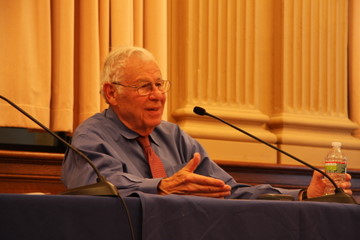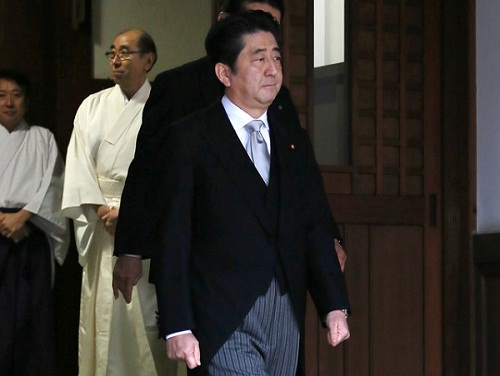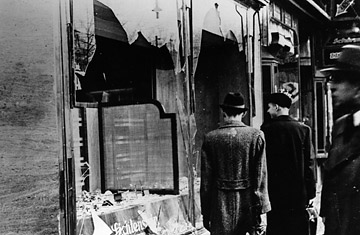
85-year-old Israeli-American sociologist, Ametai Etzioni, a child in Germany when the Nazis came into power, has this little advice to Japan – learn from Germany.
According to the sociologist, it will do Japan good if it sends 200 public intellectuals as well as political leaders to the once Nazi-powered country to see how it faced its past, came to terms with that dark piece in its history, made it part in their education curriculum and army and never let it happen again.
“I was born as a Jewish child in Nazi Germany and I have some feeling about countries dealing with their past,” Etzioni spoke out to a group on January 27 at the National Press Club in Washington.
A well-known professor of international affairs in George Washington University, for Etzioni, Germany has faced its past head-on by identifying with it, expressed remorse for the atrocities it had done, acted on its atonement and had made it a part in their children’s education curriculum as well as its army – pounding on the newer generations of the country what went wrong in the history of their nation.
Etzioni, who was able to serve as a White House senior adviser from 1979 to 1980 and was singled out in 2001 as one of the top 100 American intellectuals, thinks Japan hasn’t been able to do the same as Germany did echoing the earlier sentiments expressed of many in South Korea and China. They have questioned why Japan had not faced up to its many brutalities in WWII the way Germany has.

These questions once again surfaced in light of Japanese Prime Minister Shinzo Abe’s visit to the dubious Yasukuni Shrine on the first anniversary of his second term, December 26 last year. The shrine was built in honor of those who died during the war in Japan including 14 ill-famed class-A and over 1,000 class-B WWII war criminals.
The shrine has long been seen by Koreans and Chinese as a representation of Japanese militarism, a state that had caused the people within the region great sufferings.
German leaders are uni-vocal in the renouncing of their Nazi past – something that Japan is not. The most unforgettable image of this renunciation was shown by former German chancellor Willy Brandt on December 1970 when he knelt on the wet ground at the memorial put up for the Jewish ghetto victims in Warsaw, Poland.
Soon after Abe’s visit to the Yasukuni Shrine, Merlel’s spokesman Steffen Seibert prompted Japan to “honestly live up” to the role it played in connection to the gruesome events that happened during the 20th century. he added that only through this honest accounting will it be possible to put up a future with past enemies, something that Germany had been seriously doing.
The controversy surrounding the current prime minister of Japan, Shinzo Abe, is not only limited to his visit to the war memorial. The Japanese politician who is a member of the country’s right-wing party has also questioned publicly if Japan’s actions during WWII should be correctly characterized as “aggression”. he also disagreed with the view that the Japanese government was involved in the compulsion of “comfort women”.
Abe, along with his right-wing associates, has also approved of the war whitewash in the textbooks used all throughout the schools in Japan and even pushed forward the revision of the country’s pacifist constitution.
Some of the actions Japan Prime Minister Abe executed has irked even its closest ally, America. The US expressed disappointment on Abe’s recent Yasukuni visit time and again pointing out that it only heightened existing tensions in the region.

John L. Thornton China Center of the Brookings Institute director Jonathan pointed this out about Abe:
“He probably calculates that the US needs me so much that I can do what I want to do. But I think what he did not sufficiently anticipate and maybe he did not really care is the damage you can very quickly do to what is such a vital bilateral relationship,” Pollack commented then added…
“(It’s) not so much in terms of the American commitment to Japan, but the trust and comfort that the American leadership has in dealing with the Japanese leadership. That’s what I think, Abe, if anything, really did not calculate his interest carefully enough and we’re dealing with the consequences today.”
For his part, Douglas Paal, vice-president for studies at the Carnegie Endowment for International Peace, sees the need for the United States to send seasoned envoys to Beijing, China; Tokyo, Japan and Seoul, South Korea to act as middlemen – get the load of complaints and claims from the respective parties then rephrase them to the counterparts in the hopes of coming with views on how to ease the tension between the three countries.
“Abe is trending toward taking a view of history significantly at odds with the American view, and that should be voiced,” he added.
Paal, who just recently returned from a visit to South Korea, said that Koreans anticipated an apology from Abe they believed is due on his visit to the detested war shrine.
“But if he continues repeatedly to visit Yasukuni Shrine, high-level substantive meetings will not be possible,” Paal pointed out.
Based on his view, Paal believes Seoul had started to relax its stance gradually in favor of official meetings with Japan but the December 26 visit Abe made to Yasukuni killed that drive very much like how it did with China’s attempted move on thawing the frozen relations it had with the country after China’s ambassador called on Japanese Foreign Minister Fumio Kishida on December 20.
Former US assistant secretary of state for public affairs and now a professor at George Washington University, P.J. Crowley, holds that Abe will listen carefully to American if the talking is done in a highly-charged political environment.
“But he is a political animal. He is going to do the things he is going to do, first and foremost as part of his own governing philosophy and his governing convictions,” Crowley said.